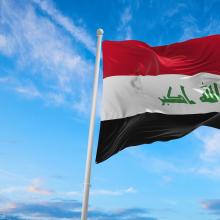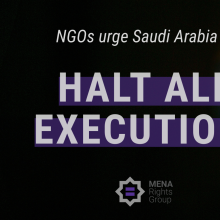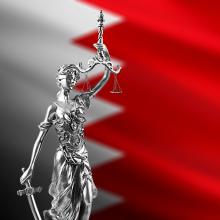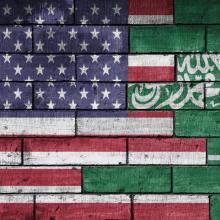May 03, 2019
By Inès Osman. Originally published on Just Security on May 3, 2019.
It’s World Press Freedom Day today, but attacks against journalists and news outlets based on allegations of “fake news” continue to spread like wildfire across the globe. And so-called “anti-fake news” legislation has flourished in recent years — Russian President Vladimir Putin signed one of the most recent measures in March.
At the same time, President Donald Trump’s discourse on fake news has created a dangerous environment, and not only for journalists working in the United States. Autocrats in countries of the Arab League that have long histories of cracking down on free speech have taken his rhetoric as carte blanche to enact further punitive legislation against alleged “false news” and “rumors.” Since 2017, Egypt, Jordan, Sudan, and Oman have either passed or proposed such laws. These measures heighten restrictions on press freedom, but also silence all forms of criticism, from both journalists and ordinary citizens.
However, while commentators were right to qualify Trump’s attacks on the media as a “gift to tyrants everywhere,” the reality is that some avant-garde tyrants already knew how to crackdown on free speech long before Trump came into office.
Saudi Arabia’s public prosecutor was relying on Article 6 of the country’s decade-old cybercrime law when he warned, in the wake of the brutal killing of journalist Jamal Khashoggi in October 2018, that “sharing or spreading rumors or fake news that might affect public order and security” could land an individual in prison for five years. Since its enactment in 2007, Saudi officials have relied heavily on the vaguely-worded text to silence critics. The 11 Saudi women human rights defenders currently on trial are the latest victims on a long list of people prosecuted under this provision for having dared to speak out against the oppressive regime.
Soon after the 2011 Arab uprisings, other countries of the Gulf Cooperation Council followed Saudi Arabia’s example. Conscious of the role played by social media in the protests, these countries’ leaders enacted cybercrime and media legislation restricting freedom of expression online.
The United Arab Emirates (UAE) was the first to follow suit in the summer of 2012, with the enactment of a “cybercrime” law forbidding the publication of “information, news, statements or rumors” intending to, among other things, “damage the reputation of the state.” Individuals contravening the law face imprisonment and a fine of up to 1 million dirhams ($272,000). It was on the basis of this law that award-winning human rights defender Ahmed Mansoor was sentenced in May 2018 to 10 years behind bars.
Two months after Mansoor’s sentencing, the UAE minister of state for foreign affairs highlighted on Twitter the “great interest” of the Western world in dealing with false news, stating that “a similar Arab dialogue is required and necessary.” Although the UAE’s acute interest in dealing with “false news” is far from recent, the tweet unveiled a clear political will to systematize – and most of all legitimize – that narrative in the Arab region. In other words, if the West is doing it, so should we.
Adopting the Term `False News’
It is no surprise, given the environment created by Trump, that these trends have spiked in recent years. One after the other, Arab leaders took the stage and vowed to combat “fake news.”
Interestingly, the pre-Trump-era Saudi and Emirati cybercrime laws typically did not use the term “false news” – the Emirati text, for example, only referred to “rumors.” But they later were broadly interpreted ad hoc as covering the spreading of “fake news.” On the contrary, laws proposed or passed after 2017 – including in Oman, Egypt, Sudan, and Jordan – explicitly use the term “false news” (“الأخبارالكاذبة”), which in Arabic is rooted in the verb “to lie.” One exception is Qatar, which, in its 2014 cybercrime law, punished with three years in prison anyone who publishes “untrue/incorrect news threatening state security” (“أخبار غير صحيحة”).
In July 2018, the Egyptian parliament passed a repressive media law criminalizing the spreading of “false news” – without defining what that meant — for anyone with more than 5,000 social media followers, treating such accounts as “media outlets.” A few days after its adoption, President Abdel Fattah al-Sisi warned that Arab countries were at risk of being “blown up from within” because of “rumours, acts of terrorism, loss of hope and feelings of frustration.”
It is no coincidence that in 2018, Egypt was the country that jailed the most journalists on “false news” charges worldwide. Media workers are not the only victims of this crackdown; it has ensnared human rights defenders, critics, and ordinary citizens, too. Last December, activist Amal Fathy was sentenced to two years in prison for, among other charges, “spreading false news” for having posted a video on Facebook denouncing sexual harassment in Egypt.
Following in al-Sisi’s footsteps, Jordan’s King Abdullah II vowed in October 2018 to “combat rumors and misinformation, and counter hate speech.” In December, new amendments to the country’s cybercrime law were introduced in the House of Representatives, punishing those who publish “false news” with fines and prison terms. The text is yet to be voted on.
Arab countries share a common denominator: repressive legal arsenals said to be aimed at combating “false news,” when the main effect is really to silence their populations and create a climate of fear and self-censorship.
It is terrifying to see that, on Reporters without Borders’ map for its 2019 World Press Freedom Index, of the 19 countries colored in black to indicate press freedom conditions are “very bad,” no less than nine are members of the Arab League.
International Standards on Freedom of Expression
Arab autocrats will tell you that freedom of expression has its limits, and they are right – to a point. Under Article 19 of the International Covenant on Civil and Political Rights (ICCPR), restrictions can be imposed when, among other things, it is necessary to protect “national security” or the “public order.” Perhaps it is because they were aware of these lawful restrictions that countries of the Arab League that have imposed these draconian restrictions used the pretense of “spreading false news,” which they say undermines “state security.”
But that oversimplified assessment is mistaken at best, and perhaps disingenuous. Indeed, the United Nations Human Rights Committee has made clear that, when restricting freedom of expression pursuant to the ICCPR, a state “must demonstrate in specific and individualized fashion the precise nature of the threat, and the necessity and proportionality of the specific action taken, in particular by establishing a direct and immediate connection between the expression and the threat.” Obviously, blanket accusations that equate mere criticism by journalists and peaceful dissenting voices with “terrorism” will never meet that threshold.
Just as the fake news narrative is not new to Arab autocrats, neither is the use of security discourse as a pretext to silence dissent. Allegations of terrorism and threats to state security have long been Arab autocrats’ favorite tool to crack down on free speech, and, post-9/11, the rest of the world has been even less likely to question the legitimacy of such accusations.
It is appalling that too few countries have stood up against the trend of using allegations of fake news to stifle dissent. Although Arab dictators never needed Trump to repress dissenting voices, he did give them the possibility to do so with a stronger sense of legitimacy and entitlement, and little fear of meaningful accountability.
To celebrate press freedom, we must remember that at its core lies the fundamental right to freedom of expression. We must pay tribute to journalists, an ever-increasing number of whom are subjected to censorship, harassment, detention and, in some cases, extrajudicial execution. But we also must protect and defend ordinary citizens who are punished for merely speaking up.






